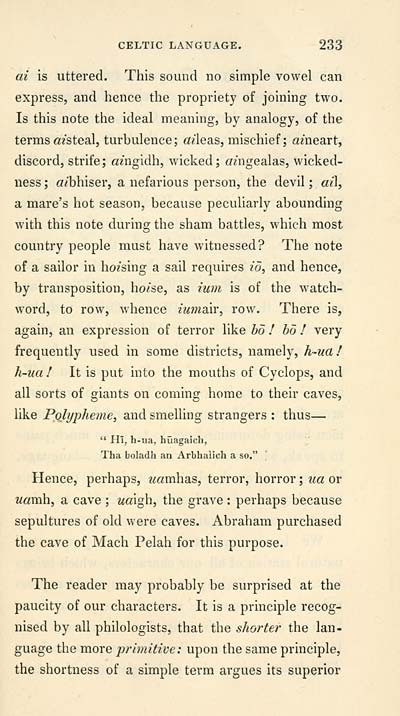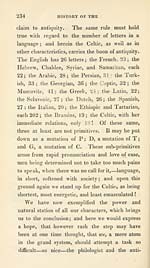Download files
Complete book:
Individual page:
Thumbnail gallery: Grid view | List view

CELTIC LANGUAGE. 233
at is uttered. This sound no simple vowel can
express, and hence the propriety of joining two.
Is this note the ideal meaning, by analogy, of the
terms «/steal, turbulence; a^leas, mischief ; ameart,
discord, strife; «mgidh, wicked; anigealas, wicked-
ness ; fir/bhiser, a nefarious person, the devil ; ml,
a mare's hot season, because peculiarly abounding
with this note during the sham battles, which most
country people must have witnessed? The note
of a sailor in ho/sing a sail requires id, and hence,
by transposition, ho/se, as ium is of the watch-
word, to row, whence iumdXv, row. There is,
again, an expression of terror like ho ! bo ! very
frequently used in some districts, namely, h~ua !
h-ua ! It is put into the mouths of Cyclops, and
all sorts of giants on coming home to their caves,
like Polypheme, and smelling strangers : thus —
" Hi, h-ua, huagaich,
Tha boladh an Ai'bhalich a so."
Hence, perhaps, zmmhas, terror, horror ; ua or
w«mh, a cave ; waigh, the grave : perhaps because
sepultures of old were caves. Abraham purchased
the cave of Mach Pelah for this purpose.
The reader may probably be surprised at the
paucity of our characters. It is a principle recog-
nised by all philologists, that the shorter the lan-
guage the more primitive: upon the same principle,
the shortness of a simple term argues its superior
at is uttered. This sound no simple vowel can
express, and hence the propriety of joining two.
Is this note the ideal meaning, by analogy, of the
terms «/steal, turbulence; a^leas, mischief ; ameart,
discord, strife; «mgidh, wicked; anigealas, wicked-
ness ; fir/bhiser, a nefarious person, the devil ; ml,
a mare's hot season, because peculiarly abounding
with this note during the sham battles, which most
country people must have witnessed? The note
of a sailor in ho/sing a sail requires id, and hence,
by transposition, ho/se, as ium is of the watch-
word, to row, whence iumdXv, row. There is,
again, an expression of terror like ho ! bo ! very
frequently used in some districts, namely, h~ua !
h-ua ! It is put into the mouths of Cyclops, and
all sorts of giants on coming home to their caves,
like Polypheme, and smelling strangers : thus —
" Hi, h-ua, huagaich,
Tha boladh an Ai'bhalich a so."
Hence, perhaps, zmmhas, terror, horror ; ua or
w«mh, a cave ; waigh, the grave : perhaps because
sepultures of old were caves. Abraham purchased
the cave of Mach Pelah for this purpose.
The reader may probably be surprised at the
paucity of our characters. It is a principle recog-
nised by all philologists, that the shorter the lan-
guage the more primitive: upon the same principle,
the shortness of a simple term argues its superior
Set display mode to: Large image | Transcription
Images and transcriptions on this page, including medium image downloads, may be used under the Creative Commons Attribution 4.0 International Licence unless otherwise stated. ![]()
| Early Gaelic Book Collections > Blair Collection > History of the Celtic language > (239) |
|---|
| Permanent URL | https://digital.nls.uk/76181238 |
|---|
| Description | A selection of books from a collection of more than 500 titles, mostly on religious and literary topics. Also includes some material dealing with other Celtic languages and societies. Collection created towards the end of the 19th century by Lady Evelyn Stewart Murray. |
|---|
| Description | Selected items from five 'Special and Named Printed Collections'. Includes books in Gaelic and other Celtic languages, works about the Gaels, their languages, literature, culture and history. |
|---|

